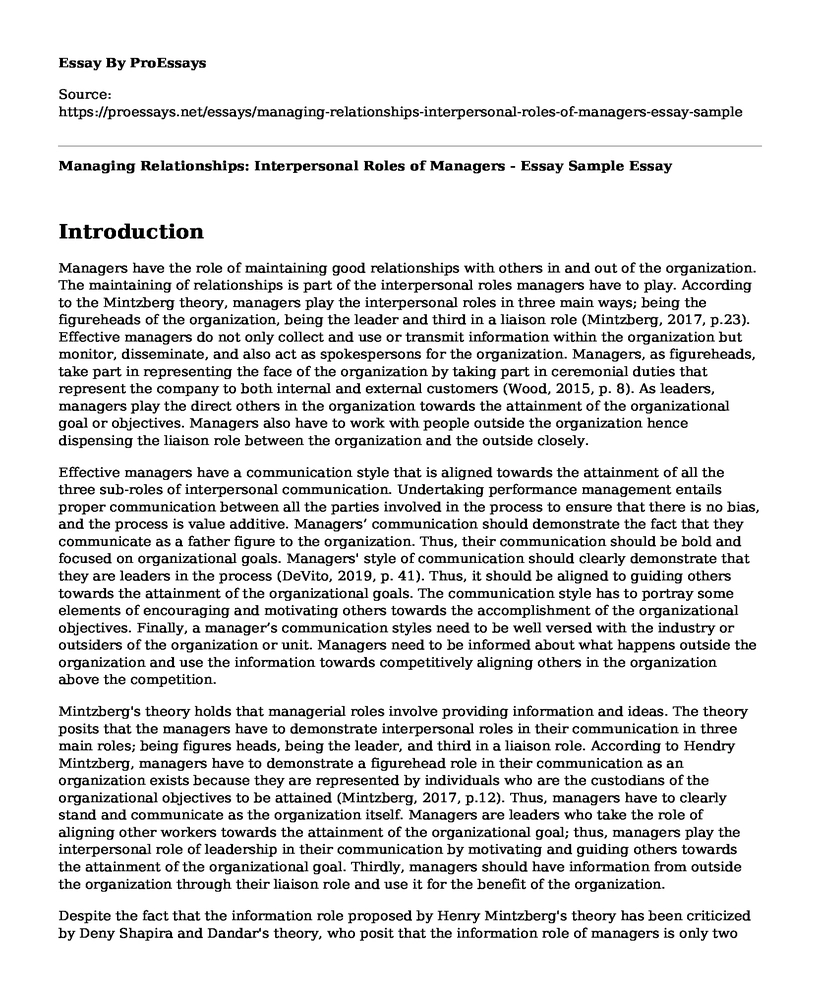Introduction
Managers have the role of maintaining good relationships with others in and out of the organization. The maintaining of relationships is part of the interpersonal roles managers have to play. According to the Mintzberg theory, managers play the interpersonal roles in three main ways; being the figureheads of the organization, being the leader and third in a liaison role (Mintzberg, 2017, p.23). Effective managers do not only collect and use or transmit information within the organization but monitor, disseminate, and also act as spokespersons for the organization. Managers, as figureheads, take part in representing the face of the organization by taking part in ceremonial duties that represent the company to both internal and external customers (Wood, 2015, p. 8). As leaders, managers play the direct others in the organization towards the attainment of the organizational goal or objectives. Managers also have to work with people outside the organization hence dispensing the liaison role between the organization and the outside closely.
Effective managers have a communication style that is aligned towards the attainment of all the three sub-roles of interpersonal communication. Undertaking performance management entails proper communication between all the parties involved in the process to ensure that there is no bias, and the process is value additive. Managers’ communication should demonstrate the fact that they communicate as a father figure to the organization. Thus, their communication should be bold and focused on organizational goals. Managers' style of communication should clearly demonstrate that they are leaders in the process (DeVito, 2019, p. 41). Thus, it should be aligned to guiding others towards the attainment of the organizational goals. The communication style has to portray some elements of encouraging and motivating others towards the accomplishment of the organizational objectives. Finally, a manager’s communication styles need to be well versed with the industry or outsiders of the organization or unit. Managers need to be informed about what happens outside the organization and use the information towards competitively aligning others in the organization above the competition.
Mintzberg's theory holds that managerial roles involve providing information and ideas. The theory posits that the managers have to demonstrate interpersonal roles in their communication in three main roles; being figures heads, being the leader, and third in a liaison role. According to Hendry Mintzberg, managers have to demonstrate a figurehead role in their communication as an organization exists because they are represented by individuals who are the custodians of the organizational objectives to be attained (Mintzberg, 2017, p.12). Thus, managers have to clearly stand and communicate as the organization itself. Managers are leaders who take the role of aligning other workers towards the attainment of the organizational goal; thus, managers play the interpersonal role of leadership in their communication by motivating and guiding others towards the attainment of the organizational goal. Thirdly, managers should have information from outside the organization through their liaison role and use it for the benefit of the organization.
Despite the fact that the information role proposed by Henry Mintzberg's theory has been criticized by Deny Shapira and Dandar's theory, who posit that the information role of managers is only two ways; the gathering of the information and applying the information for decision making (Mintzberg, 2017, p.23). Generally, the roles of management are complex and entail information use inside and outside the organization to competitively position the organization against the competition. It is in this context that the role of management extends beyond just gathering information and using it for decision making but also managers representing the face of the organization as figureheads. Managers are also leaders in the organization, so play the interpersonal role of guiding other workers towards the attainment of the organizational goals, and finally, the Managers have to liaise with others outside the organization to have information that will be used to strategically position the organization competitively.
Reference List
DeVito, J.A., 2019. The interpersonal communication book. Instructor, 1, p.18.
Mintzberg, H., 2017. Developing theory about the development of theory. In Handbook of Middle Management Strategy Process Research. London: Edward Elgar Publishing.
Wood, J.T., 2015. Interpersonal communication: Everyday encounters. New York:Nelson Education.
Cite this page
Managing Relationships: Interpersonal Roles of Managers - Essay Sample. (2023, Aug 26). Retrieved from https://proessays.net/essays/managing-relationships-interpersonal-roles-of-managers-essay-sample
If you are the original author of this essay and no longer wish to have it published on the ProEssays website, please click below to request its removal:
- Individual Evaluation and Strategic Orientation in Companies
- How a Nurse Leader Helps a Nurse Colleague Pursue Their Professional Goals Essay
- Paper Example on Finance and Strategic Management
- Change Management Position Paper Example
- Essay on Pro Sports Bike: Internal Analysis to Identify Characteristics & Performance
- Essay Sample on Operational Strategy: Key for Business Success
- Essay Example on Average CEO Salary at 6-Member Corporation: EPS 5







